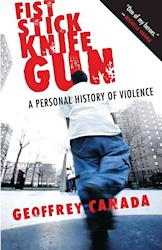2020 February
2018 December August June February
2017 December September June March
2016 November August June March
2015 December October July May February
2014 December October July April February
2013 December October August May February
2012 December September July April February
2011 December September July April February
from the February, 2013 issue of Kiai!
Book Review:
Geoffrey Canada's Fist Stick Knife Gun
By Senpai Ryan Libel
Director of Operations
What impact does a flood of deadly, cleverly marketed guns have on an entrenched cultural system of violence?
As theories of violence as a public health problem have propagated, I have been intrigued by the big ideas coming out of organizations like Ceasefire (now renamed Cure Violence), with their courageous presences in violent neighborhoods around the world, and by the work of people like Geoffrey Canada, who helped create the Harlem Children’s Zone, a not-for-profit credited with saving the lives of many children in New York by providing them with safe spaces filled with caring veterans of urban trench warfare.
 Fist Stick Knife Gun, Canada’s autobiographical account of his childhood in the South Bronx and of his work at the Harlem Children’s Zone, provides a fast entry into a world that people with backgrounds like mine are typically spared. The book’s greatest asset is its blunt accounting of a life lived without choices, a life where refusal to engage in violence is not an option, where street fights are as commonplace as bicycle rides were in my neighborhood growing up. While for me growing up in Wichita, Kansas a flat bike tire two blocks from home was a pressing concern, Canada and his peers stood on corners practicing knife techniques. In fact, as a young boy Canada was so eager to shave a tenth of a second off his spring-loaded opening of a not-quite switchblade that he risked too much and nearly lost a finger, a wound he has never had fixed because he wants the reminder of his roots.
Fist Stick Knife Gun, Canada’s autobiographical account of his childhood in the South Bronx and of his work at the Harlem Children’s Zone, provides a fast entry into a world that people with backgrounds like mine are typically spared. The book’s greatest asset is its blunt accounting of a life lived without choices, a life where refusal to engage in violence is not an option, where street fights are as commonplace as bicycle rides were in my neighborhood growing up. While for me growing up in Wichita, Kansas a flat bike tire two blocks from home was a pressing concern, Canada and his peers stood on corners practicing knife techniques. In fact, as a young boy Canada was so eager to shave a tenth of a second off his spring-loaded opening of a not-quite switchblade that he risked too much and nearly lost a finger, a wound he has never had fixed because he wants the reminder of his roots.
Where are the parents? Is a question that comes out a lot about street violence. As part of an answer, Canada dedicates his book to his own mother and shows us where she was: working hard to make a living for her family. Her passion for dimestore novels provided the means for Canada’s eventual path to Bowden and Harvard; he read everything he could get his hands on growing up and was a great student. Of fathers, Canada dismisses his own on page one as “not a bad man” but “not much of a father.” He was an alcoholic super of a building in Harlem. He never really mentions fathers again, except to make it clear that he himself does his best to be a great one. It’s not that Canada is uninterested in the question Where are the parents? He just knows that for the kids he’s looking at right in front of him on any given day at the Harlem Children’s Zone it doesn’t matter. The frightened child sitting across from him at his desk must be taken where he is – the odds of a parent significantly changing the equation at that point are nil.
Canada also prescribes by way of example another idea – that charter schools can offer a solution. I and many readers, I’m sure, hesitate to put too much stock in charter schools as a top-down institutional solution to anything except perhaps enshrining less pay for teachers, but it is obvious that in some places Canada knows well they have made real differences in kids’ lives. Canada also knows too well how the traditional education system has failed so many.
The Harlem Children’s Zone is working wonders, and the biggest lesson of Canada’s book is what his work has taught him about what adults can do for kids. He says that listening to kids is the only way to prevent violence, and tells stories that detail cases when doing exactly that saved lives. Canada himself has lost a lot, so he also knows firsthand what these kids need. They need to be met where they are. They need allies, not judgment and the criminal justice system. They need help from those who know how to navigate the realities of the streets, help in puzzling out their difficult and dangerous social interactions. They need to discuss the realities of violence. They need people to help keep them alive. They need more places like the Harlem Children’s Zone, and more people like Geoffrey Canada.
About Geoffrey Canada: In addition to his work as President of the Harlem Children’s Zone, Canada is a third-degree black belt in Tae Kwon Do and the founder of the Chang Moo Kwan Martial Arts School, where he teaches the principles of Tae Kwon Do to community youth along with anti-violence and conflict-resolution techniques.
